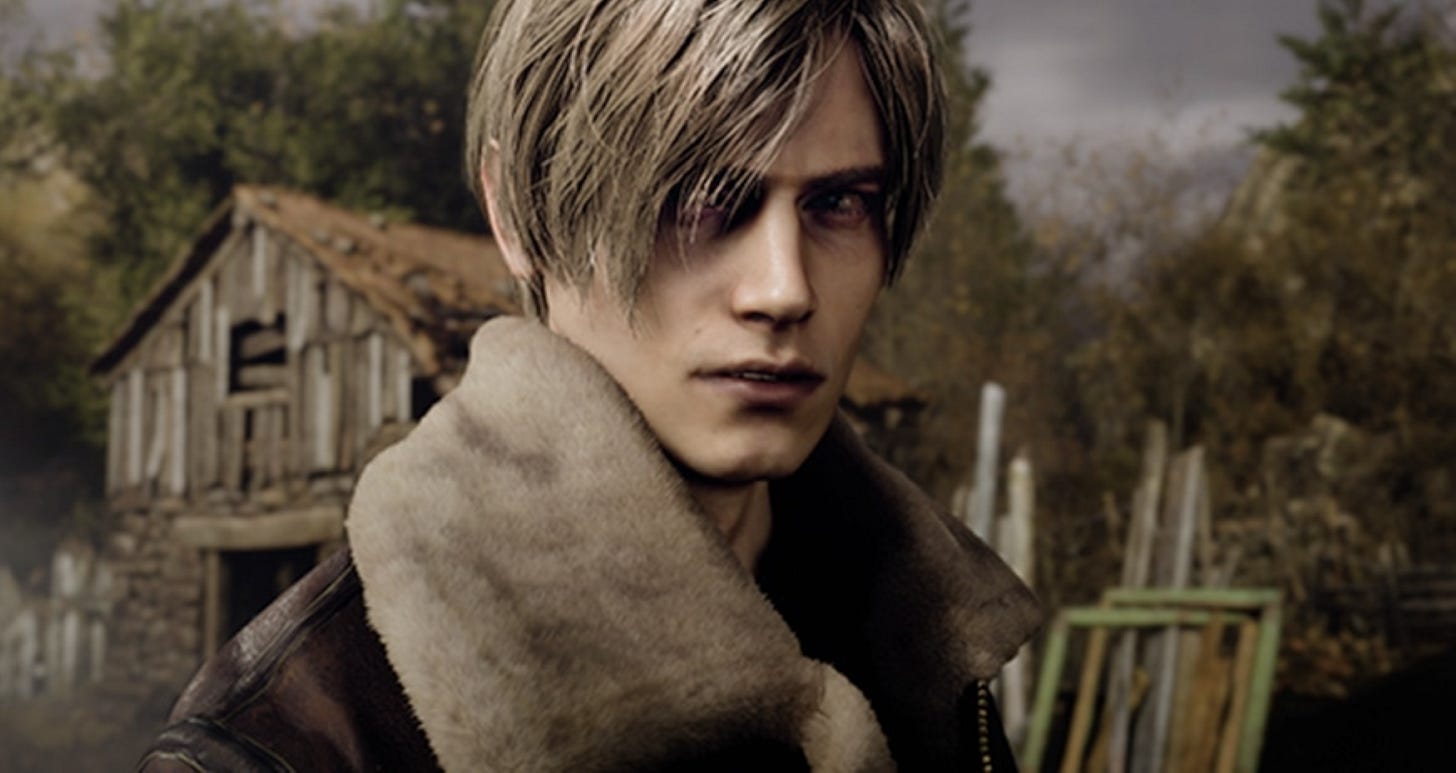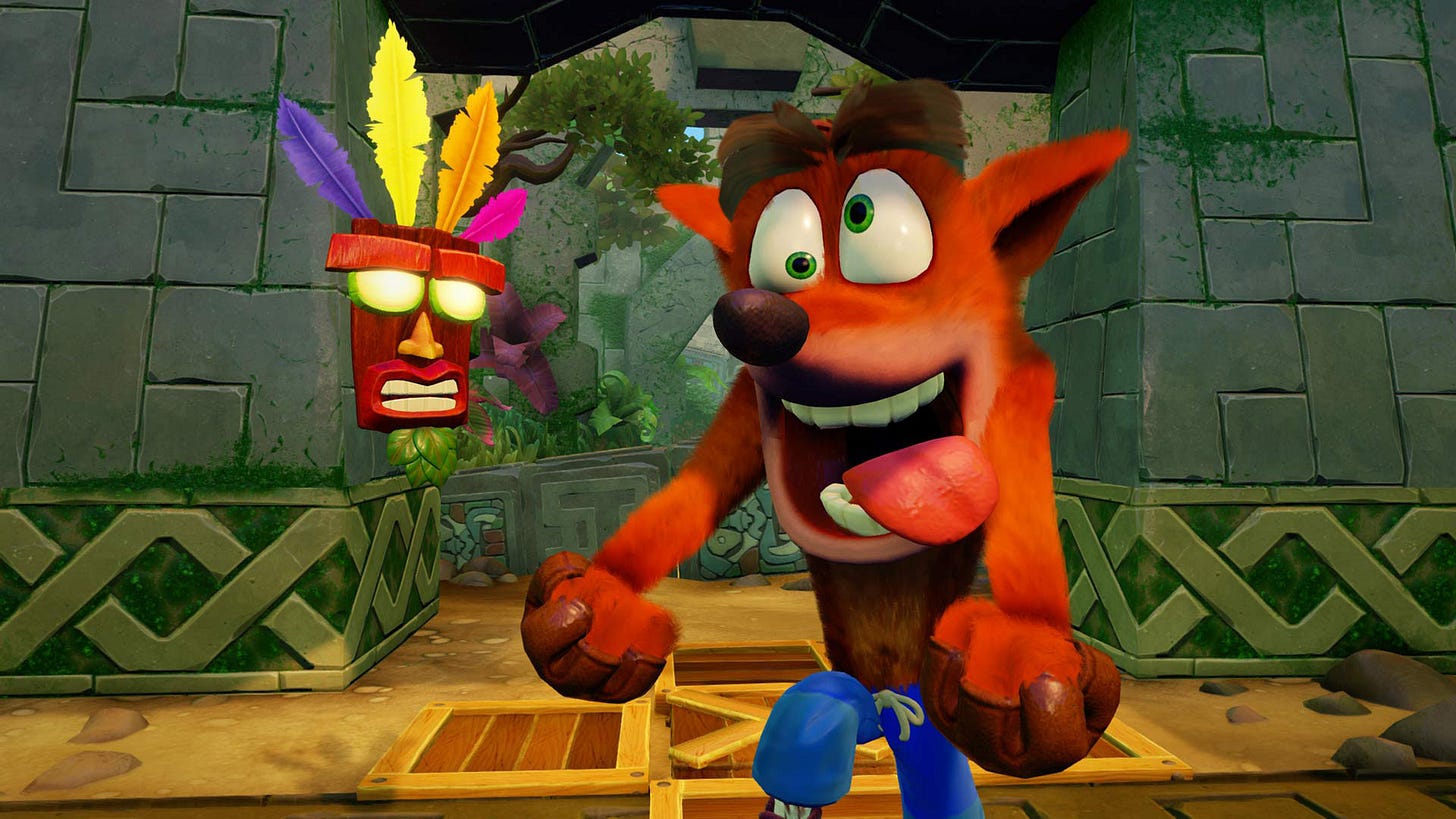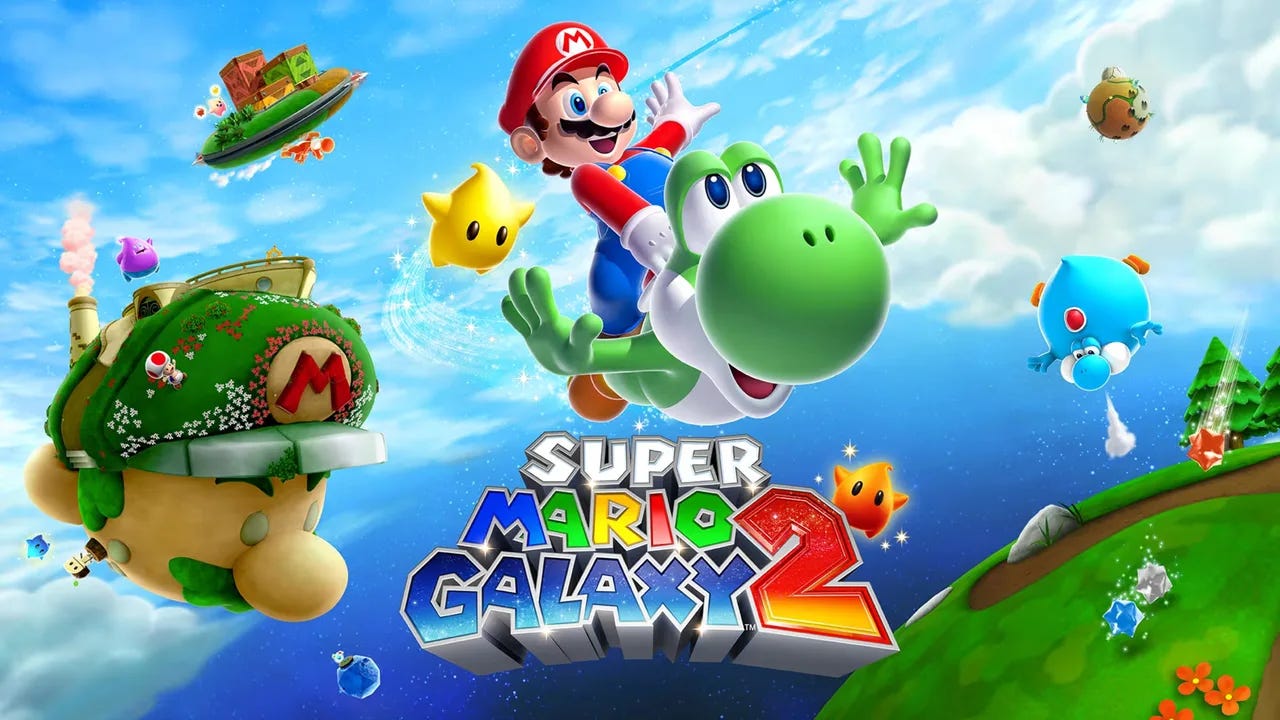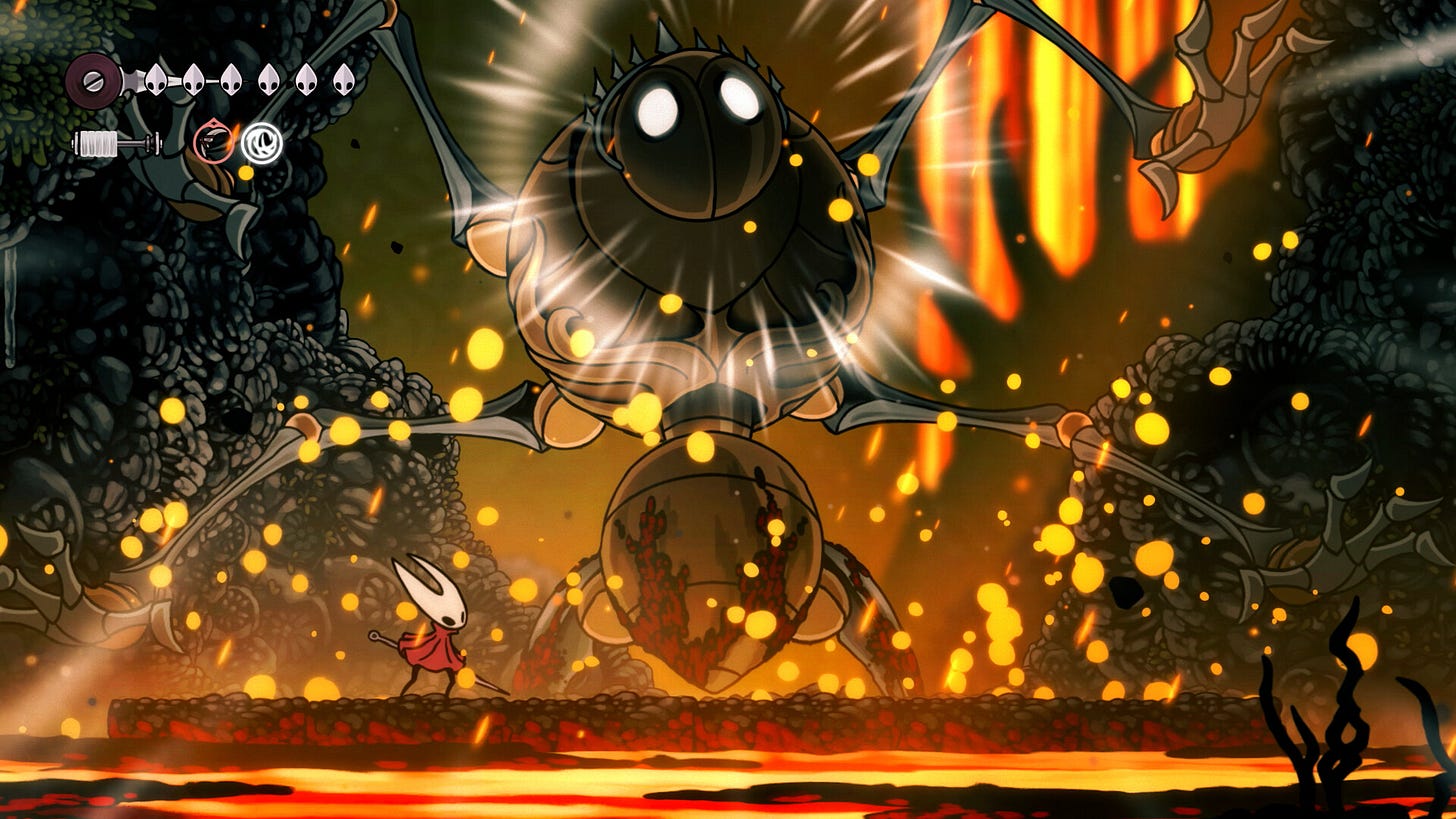On remaking the wheel, 18/09/2025
Diving into our decades-old gaming libraries
This week’s Video Games Industry Memo is sponsored by Testronic.
Delivering QA & Localisation excellence to some of the world’s biggest games studios and publishers for over 25 years
We break down remasters, remakes and reboots and why they’re so successful
Nintendo’s one-hour Direct gives a lot to chew on
After finally giving Silksong a go, I continue to not talk about it
Hello VGIM-lings,
Other George here, kicking off a mini retro block on VGIM while regular George is off taking his well deserved break.
This week we’re celebrating our favourite prefix: remasters, remakes, remakesters, reboots, revivals, and… ports. Recently, major gaming publishers are relying heavily on these types of games rather than striving to create something brand-spanking new. If you’ve seen a befuddled Harrison Ford in Blade Runner 2049 or seminal bisexual text The Mummy (1999) then you get the idea.
You only need to look at this week’s Nintendo Direct to see how prevalent the trend is. Nintendo is the one member of the big three known for its creativity and originality, and yet of the 44 games revealed we saw 26 ports, six remakes, and four series revivals.
Despite their prevalence, they aren’t reaching the tippity-top. Only one of the five games that have scored more than 90 on Metacritic this year could be reasonably put into any of these categories.
Yet maybe they don’t have to change the world. Leaning on a library of legacy games isn’t necessarily a bad thing for the industry or consumers.
So let’s swim in the sea of gaming stats, and see what looking back over an older library can do for a company. It’s time to take you through the gaming equivalent of something old, something new and something borrowed - welcome to remaster academy!
The big read: On remaking the wheel
Let’s re-wind: Alright alright, settle down class. First off, we need to define our terms so we understand what we’re talking about.
Port in the storm: Ports are versions of games released on multiple platforms. Usually you use ‘port’ to describe releases that come out after the initial launch, but you can also use it to talk about version differences. For example; the shuddering and juddering PS3 port of Bayonetta is the worst one.
Remaster or disaster?: (Good) remasters make graphical, technical and quality-of-life improvements to the original game such as control, camera, and accessibility options. As the brackets suggest, this isn’t always the case. The Silent Hill HD Collection and Grand Theft Auto: The Trilogy introduced new bugs, and trod on the original games’ art direction. Other common complaints include a lack of meaningful changes; looking at you Legacy of Kain: Soul Reaver.
(Re)made from scratch: Remakes of games are built from the ground up, with a new game engine. Remakes are at their best when they make significant changes from the source like last 2023’s Resident Evil 4, 2020’s Final Fantasy 7 Remake, or this year’s Ninja Gaiden 2 Black. Whether the changes are for better or worse are the subject of vicious debate, but we can all agree that these remakes offer players something noticeably different from the original.
Faithful to a fault?: Remakes that stick very closely to the original like Metal Gear Solid Delta or Pokémon Brilliant Diamond and Shining Pearl are sometimes known as remakesters, but this is an emerging term and not commonly used yet. These are games that are built from the ground up in a new engine, but maintain almost everything else from the original - for better and often worse. Sometimes we remember games with rose-tinted glasses - and certain mechanics or sections need a few tweaks to make them more palatable for modern players. These remakesters may leave players disappointed by what could have been.
Starting over: You all probably know this one, but reboots are attempts to change up a series, and are completely different from anything that came before both story and gameplaywise, but often land in the same genre. Popular examples include DOOM (2016), Tomb Raider (2013) and God of War (2018), while Sonic the Hedgehog (2006) is the most well known misstep - mainly because it awakened a whole new generation of furries with Sonic’s utterly bizarre inter-species kiss. Shudder.
Call it a comeback: Finally, we have revivals. This is when a series receives a new entry after a long hiatus, usually of at least a decade. These are almost never made by the original studios and can follow up a successful remake or remaster or stand on their own. Last month’s Shinobi: Art of Vengeance from SEGA is an excellent recent example.
Give us what we want
The 10%: While it may seem like we’re overrun with ‘re’games, in reality, there are fewer than you think. My extremely rough estimate from the list on Releases.com spotted around 70 remasters, remakes or reboots scheduled for launch in 2025 out of roughly 700 games. This number feels low because the majority of original titles come from smaller developers, and regames are often ported to multiple consoles with different release dates.
What we want: Strategy consultancy MTM recently released the results of their study questioning 1,500 gamers on their feelings towards remasters and remakes. It found that 90% of players questioned had played a remaster or remake, while around 80% find them comforting or appealing. This is why looking at the backlog is so attractive to publishers.
One more hit: Nostalgia is a powerful drug, and sometimes nothing quite hits like another go on Mario Kart. Compound this feeling with the disposable income us more distinguished gamers tend to have and you create something beautiful. Frankly, we need nostalgia right now. As MTM puts it, “divisive politics, war, cost of living crises and a pandemic has led people to crave for simpler times.”
Passing the torch: People also want to share nostalgia with the next generation. Those who played these games as children now have little ones of their own. One respondent said, “It’s great to share experiences from my childhood with my children. I get to play a classic game that is now modern, they get to play it for the first time, and then we all get to experience it together.” With countless games lost to time, there is also a compelling argument that these remakes and remasters help preserve software that would otherwise be forgotten.
Modern audiences: Modernisation is essential to the popularity of regames. Gamers choose remasters or remakes over the original in a large part because of accessibility settings like subtitles and improved approachability by adding new camera, save, or control options. Fixing the bugbears people had with the original game is vital to a rerelease's success. There’s a reason that The Legend Of Zelda: Wind Waker HD on Wii U added the Swift Sail.
A message from our sponsor Testronic: Boasting Centres of Excellence & Innovation in Europe, the US and South East Asia, Testronic is positioned to provide outstanding QA Testing & Localisation services to leading studios and publishers around the world.
Whether it’s providing expert support for flawless gameplay or gold standards in localisation, Testronic is a trusted partner for the biggest names in games.
Find out more at www.testroniclabs.com
Low risk, high reward
Time crunch: The emergence of the regame has been a boon for both consumers and developers. As hardware improves, development cycles are extended and costs skyrocket. In the ‘80s it was normal for someone to make a game in their bedroom in a week. The solo dev still exists, but Balatro is no longer built in a day. Even small projects spend several years in development before they are unleashed onto the world.
Solid foundations: With a large amount of the work already done, regames can be made by fewer people, in much less time, and at a far lower cost. Even when not using the game’s original code, building from an existing story, characters and level design is a humongous first step. Remakes can even take shortcuts by using assets or even the engine from newer games in the series á la Ryu Ga Gotoku with the much loved Yakuza remakes.
Failure to fail: Not only is the financial cost much lower, but the risk is too. Regames leverage an established fan base and reputation to ensure excellent sales for the new venture. Last year’s remake of Silent Hill 2, for example, has already more than doubled the sales of the original game, while Resident Evil 3’s sales are almost threefold that of its predecessor. Remasters and remakes of previously popular games simply don’t fail. Just ask the Crash Bandicoot N’sane Trilogy which sold 20 million copies, outselling the three games it remade combined.
Future focused: And just like our dizzy marsupial reviving a series through regames means that a publisher can create future avenues for revenue from the franchise. You might start out by remaking a classic game or two, but with renewed interest many publishers go on to establish new entries or spin-offs. In other words, a well-polished remake or remaster can ultimately revive a whole franchise.
How to improve a masterpiece
Now what?: There are multiple things to consider when relaunching a game. While it can be tempting to try and ‘fix’ a title you think should have garnered more attention, working with an established favourite or cult classic is the safest bet. Why do you think Konami started with Silent Hill 2 and Metal Gear Solid 3?
Room to breathe: According to the above-mentioned survey, the sweet spot for rereleasing a game is between 5-8 years after the original, but I would suggest that this is the earliest you should consider it. A single generation isn’t enough of a leap to consider a remaster, particularly as consoles are backwards compatible. These games work best when there isn’t a way to play them on current hardware, and if you release too many versions close together you will likely incur gamers’ wrath like the twice remade PS3 classic, The Last of Us.
To change or not to change: Whether or not to make a ‘faithful’ regame is contentious, with opinions split straight down the middle, but there is consensus on what changes should be made. Overall, if new versions offer both original and updated styles of play then everyone wins. In order of importance, people say that at a minimum regames should upgrade: graphics, controls, camera styles, saves and accessibility options. These are just the basics and those wishing to go a little deeper should look at common complaints from the original release.
Remaking the wheel: Remakes are trickier when it comes to changes and developers should accept that they won’t please everyone. Passionate fans of the original are difficult to please, but they will always have their baby. A good remake should focus on capturing the same story, characters, and key set pieces that people love, but can show more creativity and fresh utilisation of new technology. Remakes work best when they produce a game that’s exciting to play whether you’ve heard of the original or not. These games are also more likely to spawn series revivals.
Price is Right: And finally we come to the all important financials. As one respondent put it, “I’m just not willing to pay that amount of money to buy a game that I've basically already played before.” The pricing isn’t really to do with the amount of work put in, but the feeling that it should cost less than regular big budget titles. People are still willing to pay close to full price, they just want to believe they’ve received a discount.
Last rewind: Regames are a vital part of the game industry’s ecosystem and are currently beneficial to both developers and consumers. Not only do they offer something nostalgic for the player, but they help bring in revenue for publishers while they are working on new IPs. For this to work, thought has to be put into how best to bring these games into the modern era, not just in new content, but including at what time and price is best to launch.
News in brief
Direct hits: Nintendo held its longest Direct ever last week, jam-packed with over an hour of upcoming games. Major highlights include a new Yoshi game, Yoshi and the Mysterious Book, Pokémon farming sim Pokopia, and a new Fire Emblem game in Fortune’s Weave. Most bizarre was the announcement that 16 Virtual Boy games were gaming to Switch Online, which, if you’re not aware, makes up two-thirds of the proto-VR headset’s entire library of games.
Starry-eyed: Now that Silksong is out, the clown make-up has been passed to Star Citizen backers who have donated over $865 million to something that is… well, still barely a game. The single-player campaign, Squadron 42, is scheduled to launch in 2026 after 13 years in development, but during a live showcase content director Jared Huckaby admitted that it might not happen. "The team is heads down,” he said. “We drew a line in the sand when we said 2026. I don't know if we're going to make it, I just know that we're going to do every single thing possible to make it.” Very comforting.
Mouthwashing: Saudi Arabia continues to wiggle its fingers in the gaming industry, as Ubisoft recently announced a free DLC for Assassin’s Creed Mirage, reportedly with help from the country’s Public Investment Fund. While CEO Yves Guillemot seems happy to work with Saudi Arabia, staff at Ubisoft might not be. At an internal Q&A a member of Ubisoft’s social and economic committee asked if management thought that "seeking a contract with a person accused of crimes against humanity… could contribute to the Ubi-bashing the company is currently suffering?" Management responded with something like ‘eh, it’ll be fine’.
Gut Punch: Sucker Punch Studios have allegedly fired an artist working on Ghost of Yotei after they made a joke on social media about Charlie Kirk’s shooting. Now former Sucker Punch employee Drew Harrison wrote "I hope the shooter’s name is Mario so that Luigi knows his bro got his back” on Bluesky, and claims that they were fired after an online campaign called for their dismissal over the post. They have since written, “If standing up against fascism is what cost me my dream job I held for 10 years, I would do it again 100x stronger.”
For fs sake: Games journalism is crumbling. A few behemoths own the majority of sites and pay people peanuts for their work and you know what happens when you pay peanuts. A reviewer of Silent Hill f took to Reddit to post their thoughts on the game ahead of embargo completely convinced that embargoes are the same as review deadline, and not the date after which you are allowed to talk about the game. Breaking one will usually lead to blacklisting, so it was probably best to stay silent.
Moving on
James Megretton is now Product Marketing Manager at Curveball Games… Andrew Walsh has joined EA/Criterion/Dice as Senior Narrative Director… Eric Grouse joins The Pokémon Company International as Chief Legal Officer… Corey van den Hoogenband becomes Community Project Manager at Digital Extremes… And Rebecca Chang joins Capcom as Brand Marketing Manager…
A message from our sponsor: Testronic is seeking the industry’s best QA Testing & Localisation talent to bolster teams in its Centres of Excellence in Europe, the US and South East Asia.
We’ve already made over 160 hires since July, and are looking for more passionate individuals at all levels to join our talented teams. We’re hiring across all disciplines, as we expand our operations to serve our clients.
Visit our LinkedIn page to find out more.
Jobs ahoy
GamesBeat is hiring for a Lead News Writer… Playground Games is looking for a Production Assistant to work on Fable… Rebellion needs a new QA Analyst… Blizzard is hiring for numerous roles including a Senior Software Engineer for Overwatch 2… Secret Mode is on the lookout for a new Senior Product Marketing Manager…
Events and conferences
NZGDC, Wellington - 25th-27th September
Tokyo Games Show, Tokyo - 25th-28th September
Nexus Games Summit, Dublin - 1st-2nd October
Games Connect Asia Pacific, Melbourne - 6th-8th October
Brazil Games Show, São Paulo - 9th-12th October
Game of the week - Hollow Knight: Silksong
All quotes are cherrypicked from negative Steam reviews.
“If you thought Hollow Knight needed longer runbacks, horrible economy and all bosses dealing two hearts of damage you are going to love Silksong.” - 1 Panda
After my unnecessarily long breakdown in the run up to Silksong, it’s only fair that I talk about it again now that I’ve actually played it. However, much like I felt before launch, it’s the response to Silksong that is more interesting than the actual game. My review is simple. It's the exact evolution of Hollow Knight I was expecting from Team Cherry, with clever level design, challenging fights, and dastardly secret areas. It’s very good. I recommend it.
“More frustrating than fun, never rewarding and almost always tedious.” - Jordan Rubow
In my original piece I noted that Silksong’s lack of review codes meant that people were without guides, and guiders were in a mad rush to get the information out there. However, the perception of the difficulty is a side effect I wasn’t expecting. Many challenging games receive a balance patch on or soon after launch. Journalists are usually the first people looking at these games with completely fresh eyes and give developers some idea of how people will handle it, meaning that they can do some tweaking and fix bugs before it enters the hands of the general public. Without any pre-release reviews, however, the fan response was the first true way to beta test the game - and the response was deafening. Silksong is by no means easy, but it’s exactly what I thought it would be, which is why I was surprised by everyone whinging about the difficulty. Yet the voices were so loud that Team Cherry toned it down.
“Incredibly frustrating. The difficulty curve is a wall. It begins at the difficulty that Hollow Knight ended at.” - tweedgeezer
Post launch, challenging games are often softened with a large data set to analyse. Silksong peaked at around 600k concurrent players on Steam and has since dropped to around a third of that. Many might return once the balancing changes have been made, but I’m sure plenty have already written it off as rage bait, and I can’t argue against that when bosses can murder you even after they die, and save points sometimes kill.
“I suddenly lost all desire to continue.” - dragohole
Before you go…
Mr Beast clearly didn’t play Mike Tyson’s Punch-Out!! as a kid or he’d know that Tyson is one of the hardest bosses in gaming history.
A clip is circulating of the 27-year-old saying he’s going to “take a punch from Mike Tyson” before the heavyweight boxer obliges him.
I suggest you watch the video for yourself to see Mr Beast getting exactly what he asked for.







